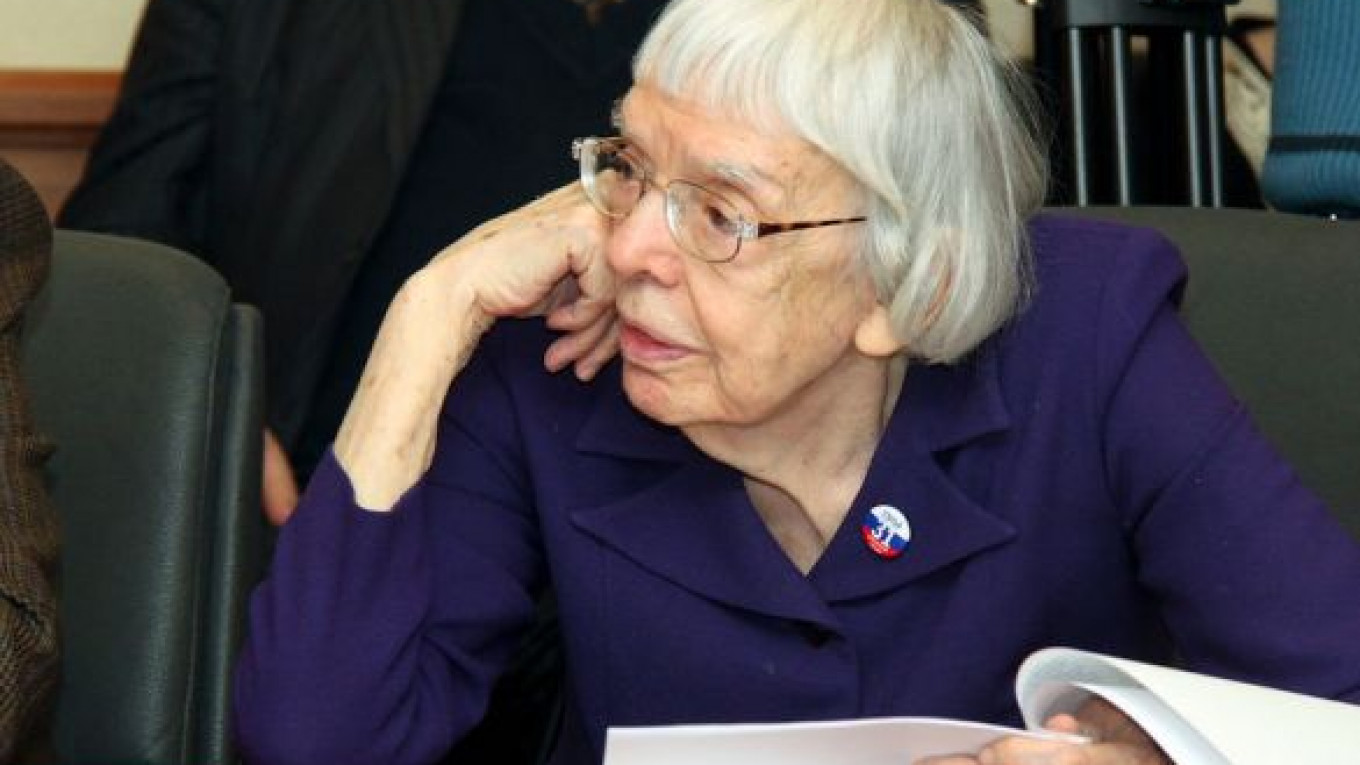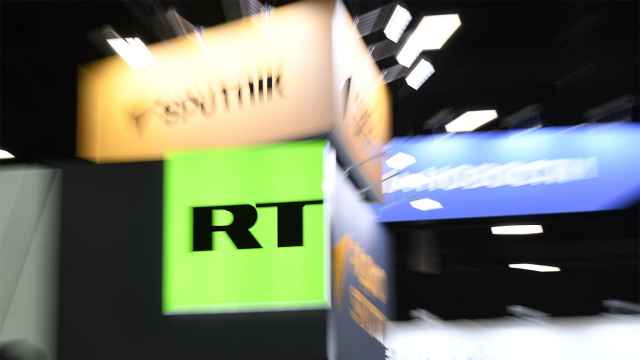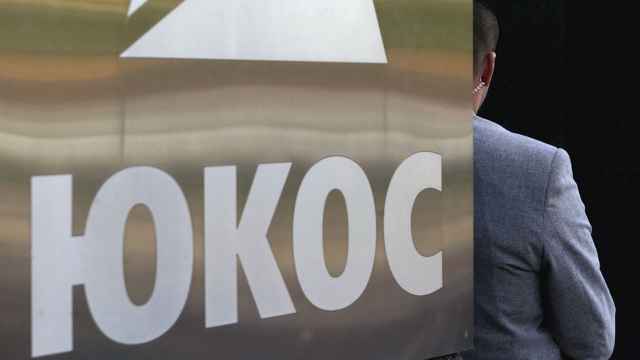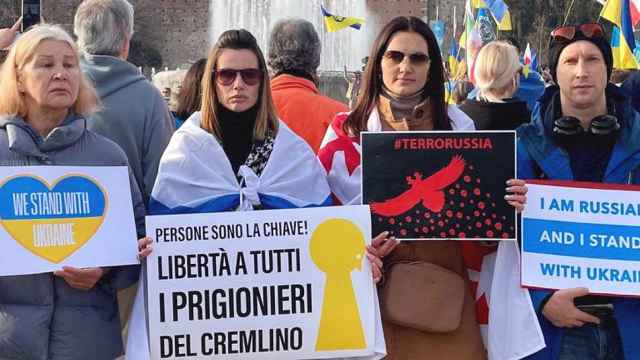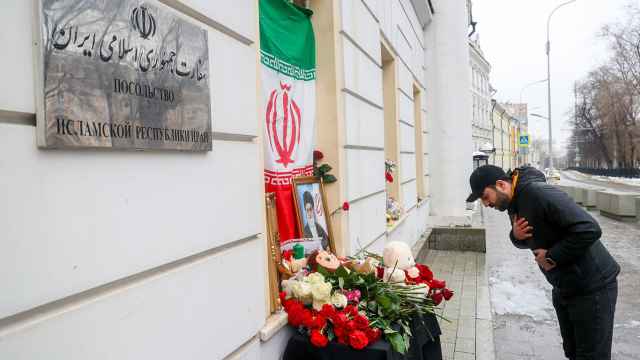Lyudmila Alexeyeva, one of the nation's most prominent human rights activists, has resigned from the Presidential Human Rights Council after the Kremlin introduced a new method of selecting members that includes a poll by Internet users.
Alexeyeva, who heads the Moscow Helsinki Group, Russia's oldest human rights organization, is the 14th person to step down from the 40-member council since President Vladimir Putin's re-election in March. The council is now in danger of not meeting its 20-member quorum.
"The decision to allow members of the council to be nominated by all NGOs, while democratic on the surface, will lead to the destruction of the council as a functioning organization," Alexeyeva, 84, said in a telephone interview Friday.
The announcement dealt a blow to the council, which has been an important bridge between human rights activists and the Kremlin and at times a fierce critic of the government.
Alexeyeva said the system, announced by chairman Mikhail Fedotov on Friday, would make the council "unviable."
"If all NGOs, right down to your neighborhood numismatist, get to vote, they'll choose somebody harmless and absolutely useless. The numismatist doesn't understand anything about the development of civil society or human rights," she said.
Alexeyeva also predicted that pro-Kremlin NGOs opposed to the spirit of the council, in her words, would also try to sabotage it.
Council members are currently selected by the president from a list of nominees put together by sitting council members.
Under the new system, proposed by the presidential administration last week, candidates will be nominated by any NGO and then voted on by Internet users. Those who receive the most votes will then be forwarded to Putin, who will make the final appointments.
"The logic is to make the selection process more open, more transparent and more democratic," Fedotov said by telephone. "The main factor is not the mechanism for choosing a candidate, but the will of the president," he added.
Thirteen spots have opened up in recent months after an exodus of council members, several of whom said they didn't want to serve under Putin.
Outgoing members include political commentator Dmitry Oreshkin; Yelena Panfilova, director of the Russian branch of Transparency International; journalist Leonid Radzikhovsky; and NGO leaders Emil Pain, Alexei Simonov, Georgy Dzhibladze and Svetlana Gannushkina.
"They don't think that Putin will listen to them," said council member Ivan Zassoursky, a journalist who campaigns for Internet freedom. Former President Dmitry "Medvedev is more of a dialogue guy. He lets you talk. Then, if he disagrees, he will tell you. Putin's manner is much bolder."
The council's designated role is to advise the president on human rights, preparing expert reports and recommendations. The group has made waves by siding against the government on the death of Hermitage Capital lawyer Sergei Magnitsky in pretrial detention and the continued imprisonment of former Yukos CEO Mikhail Khodorkovsky.
The new selection system evidently came as a surprise to Fedotov, who said the council had already whittled down a list of 30 candidates, and that several, including Grigory Shvedov of Kavkazsky Uzel and TV host Vladimir Pozner, had agreed to serve if selected.
He denied a report in Friday's Vedomosti daily that the final list included opposition-minded writer Boris Akunin, motorist rights' activist Pyotr Shkumatov, and Afisha's Yury Saprykin, although he admitted that the three had been on an earlier list.
Zassoursky said he would stay on the council until he was forced out. "I have a war. I have a fight. I'm not walking out of a fight. Why should I? I'm there to protect the freedom of the Internet. That's my mission. So if I can do something about it, then I should stay," he said.
Council member and anti-corruption activist Kirill Kabanov also said he would stay on and characterized the turbulence of the past few months as "growing pains" that reflected the council's effectiveness.
Nominations by NGOs will take place in July, followed by Internet voting in August, and a list of nominees will probably be turned over to Putin in September, Fedotov said.
The council was created under another name by President Boris Yeltsin in 1993.
A Message from The Moscow Times:
Dear readers,
We are facing unprecedented challenges. Russia's Prosecutor General's Office has designated The Moscow Times as an "undesirable" organization, criminalizing our work and putting our staff at risk of prosecution. This follows our earlier unjust labeling as a "foreign agent."
These actions are direct attempts to silence independent journalism in Russia. The authorities claim our work "discredits the decisions of the Russian leadership." We see things differently: we strive to provide accurate, unbiased reporting on Russia.
We, the journalists of The Moscow Times, refuse to be silenced. But to continue our work, we need your help.
Your support, no matter how small, makes a world of difference. If you can, please support us monthly starting from just $2. It's quick to set up, and every contribution makes a significant impact.
By supporting The Moscow Times, you're defending open, independent journalism in the face of repression. Thank you for standing with us.
Remind me later.


